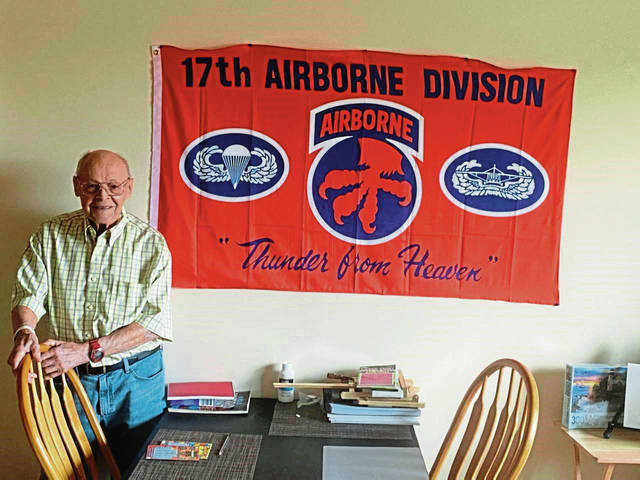https://naviga.triblive.com/local/westmoreland/jeannette-native-turns-100-recalls-winter-combat-against-german-forces-in-1945/
Jeannette native turns 100, recalls winter combat against German forces in 1945

Sam Joseph is celebrating his 100th birthday today at Weatherwood Manor in Hempfield.
Seventy-six years ago, he was among Allied troops pushing into Germany’s Rhineland, battling to bring World War II to an end on Europe’s Western Front.
The intervening decades melted away this past week as the Jeannette native shared still-vivid memories of his wartime exploits in a FaceTime interview with the Tribune-Review.
Because Joseph was colorblind, he was prevented from serving in the Air Force. But he was inducted into the Army on Jan. 25, 1944, serving as a rifleman with the 17th Airborne Division.
“They didn’t want me in the Air Force, but I got next to it in the Airborne,” said Joseph, who proudly displays a divisional banner in his room at Weatherwood.
The division took part in the Battle of the Bulge early in 1945, probing Germany’s defensive Siegfried Line after withstanding the enemy’s counterattacks in France and Belgium.
Joseph was lucky to escape with just an injury, including permanent hearing damage, when the jeep he was riding in encountered a land mine Jan. 25, 1945.
“They sent us out on an early morning patrol down this road into no-man’s land,” he recalled. “I asked if there was anyone that checked that road for mines. We didn’t go a quarter-mile until we hit a mine. We didn’t see it because there was snow over top of it.
“They couldn’t salvage any part of the jeep, but all four of us walked away. I was bleeding down the side of my neck. They said my eardrum was broken.”
Divine intervention is the only explanation Joseph can find for having survived the blast. “We think we had somebody that was in control,” he said.
In February, Joseph’s division took part in Operation Varsity, an airborne assault across the Rhine River. Joseph was among troops who landed in a field across the river, in gliders that were big enough to carry a jeep.
“The dive bombers would come in and bomb the gunners on the river,” he said. “We were supposed to protect them and the area where they wanted to put the crossing in.
“It was pretty hairy at times. The glider in front of us went between two trees, and it took both wings off about 50 feet off the ground. We never knew what happened to them. Our pilot went around those trees, and we landed safely, but it could have been us.”
Joseph carried a Browning Automatic Rifle and 140 rounds of ammunition but took German prisoners without having to shoot. “All I had to do was say, ‘Halt,’ and they’d stop,” he said.
One surrender caught him by surprise. “I was at a big schoolhouse and had my back turned,” he recalled. “A guy came up behind me and said, ‘Hey, comrade.’ He was an 18-year-old kid. He was scared to death, and he scared me to death because I didn’t know he was there. I asked him if he had any weapons, and he said he threw them away.”
It was fortunate for Joseph he was in top physical condition when he entered the service. “I was a gymnast in high school, doing backflips and somersaults, so my legs were in shape,” he noted.
Carrying his rifle and ammunition, he said, “I was probably about 50 pounds heavier than I really was.”
Like others in his unit, Joseph wasn’t prepared for the bitter winter cold on the Western Front, where he said temperatures sometimes dropped to 20 degrees below zero.
He grew a beard and discovered, “The heat from my body would melt the snow on my face and freeze into ice at night.
“We were there in our summer underwear, and we didn’t have winter shoes yet. Most guys got frozen feet.”
Noticing the steam rising from piles of manure in the fields, he said, “We would get buckets of it and we’d stand in it. The guys didn’t like the smell, but they got the heat from the manure.”
After his discharge from the Army on Nov. 6, 1945, Joseph sought out training and became a patternmaker at General Motors’ Fisher Body plant near Dravosburg, where he eventually retired.
In his spare time, he enjoyed woodworking.
“I made grandfather clocks for each of my kids,” he said. “I went down to the woods, picked out a tree, cut it into lumber and had it aged for about six months. That’s what I would make my clocks out of.
“It took quite a while. I had six kids.”
His family since has grown to include 13 grandchildren and 22 great-grandchildren.
Joseph is one of the rapidly disappearing veterans who came to their nation’s defense in World War II.
Citing statistics from the U.S. Department of Veterans Affairs, The National WW II Museum notes fewer than 326,000 of the 16 million Americans who served in the war remained alive last year, including fewer than 19,000 in Pennsylvania. It’s projected their numbers will fall to fewer than 100,000 nationwide by 2024.
A member of the Irwin American Legion, Joseph recommends military service for younger generations.
“I feel just as good today as I did when I was in the service,” he said, but he added, “I probably can’t march double-time like I used to.”
Copyright ©2026— Trib Total Media, LLC (TribLIVE.com)
